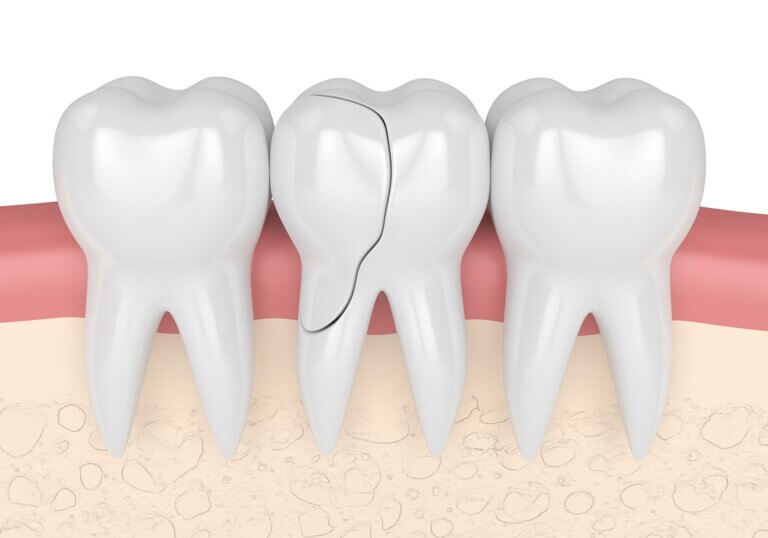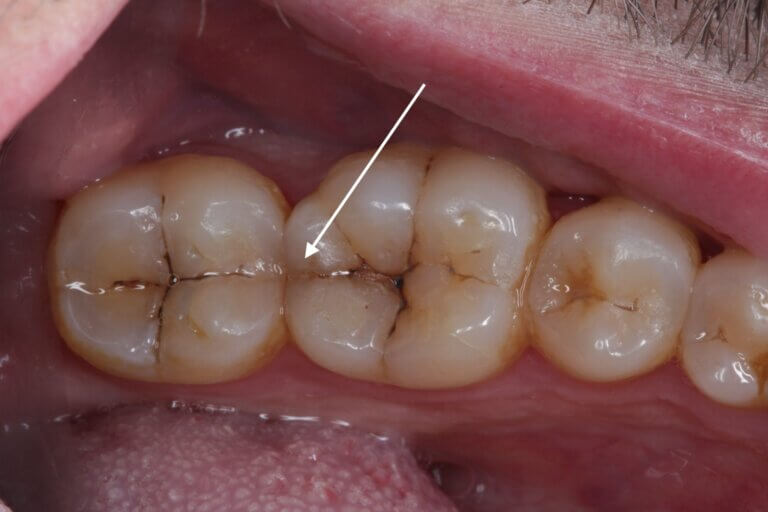Cracked Molar

What Is a Cracked Molar?
A cracked molar is a type of dental fracture that occurs in one of the back teeth—molars—which are responsible for heavy chewing and grinding. These cracks can range from minor surface lines in the enamel to deep fractures that extend into the dentin or even the pulp (nerve) of the tooth. Because molars absorb significant biting force, they are more prone to cracking, especially if they’ve been weakened by large fillings, trauma, or teeth grinding.
A cracked molar may not always be visible, but it can cause sharp pain when biting, temperature sensitivity, or discomfort that comes and goes. If left untreated, a cracked molar can lead to infection, abscess formation, or tooth loss. Understanding the symptoms and treatment options is essential to prevent further damage and preserve your molar tooth.
Before you contact a Toronto dentist to examine a cracked molar, here are some key points to know as a patient:
- Why Do I Have A Cracked Molar?
- Signs And Symptoms Of A Cracked Molar
- Treatment Options For A Cracked Molar
- Managing A Cracked Molar Until You Can See The Dentist
- Frequently Asked Questions About Cracked Molar
If you have questions about A Cracked Molar or other dental problems, please contact us for more information.
Why Do I Have A Cracked Molar?
Cracked molars are a common dental issue, especially given the heavy chewing forces that back teeth endure. Several factors can contribute to a cracked molar, including:
- Dental trauma: A direct injury to the mouth—such as a fall, car accident, or sports-related impact—can cause a molar to crack.
- Tooth decay: Tooth decay weakens the molar tooth structure, making it more susceptible to cracks and fractures.
Chewing Hard Foods or Objects: Biting down on hard items like ice, popcorn kernels, hard candies, or even pens can place excessive stress on molars and lead to fractures. - Teeth grinding: Chronic teeth grinding or clenching can wear down and weaken molars over time. A custom night guard may be recommended to protect your teeth.
- Age-related wear and tear:Over the years, repetitive biting and chewing can make molars more brittle and prone to cracking.
- Large dental fillings: Molars with large or old fillings are structurally weaker and more vulnerable to cracks. A preventative dental crown may be advised to reinforce the tooth.
- Root canal treated teeth: After root canal therapy, molars become more brittle due to the loss of internal moisture and nutrients. These teeth are typically reinforced with dental crowns to prevent future cracks.
Understanding these causes can help you prevent future damage and preserve the strength of your molars. If you have further questions about A Cracked Molar, please contact us.
Signs and Symptoms of a Cracked Molar
Recognizing the symptoms of a cracked molar early can help you avoid more serious dental complications. Common signs include:
- Pain when biting or chewing: Especially when releasing pressure, this pain may come and go depending on how the crack flexes.
- Sensitivity to hot, cold, or sweet foods: Cracks can expose the inner dentin or pulp, causing sensitivity to hot, cold, or sugary foods and drinks.
- Visible cracks or chips: In some cases, a crack may be visible on the biting surface or side of the molar.
- Gum inflammation: A crack that extends below the gumline may irritate surrounding tissues, causing redness or localized swelling.
- Toothache Without Obvious Cause: Some cracked molars may produce intermittent pain that’s difficult to pinpoint.
If you’re experiencing any of these symptoms, it’s important to see a Toronto dentist promptly to prevent the crack from worsening or leading to infection. If you have further questions about signs and symptoms of a Cracked Molar, please contact us.
Treatment Options for a Cracked Molar
Treatment for a cracked molar depends on the location, depth, and severity of the crack:
- Dental Crown: For minor to moderate cracks that do not involve the pulp, a dental crown can effectively cover and protect the molar. Crowns restore strength, function, and aesthetics—especially for molars that take on heavy chewing forces.
- Root Canal Treatment: If the crack extends into the pulp (nerve) of the tooth, a root canal is typically required to remove the infected or inflamed tissue. A crown is placed afterward to prevent further damage.
- Tooth Extraction: If the crack extends below the gumline or into the root, the molar may not be salvageable and could require extraction. Afterward, replacement options like dental implants or bridges can restore your smile.
Your dentist will assess the extent of the crack and recommend the most suitable treatment to preserve your oral health and restore function. If you have further questions about how to treat a Cracked Molar, please contact us.

Managing a Cracked Molar Until You Can See the Dentist
If you suspect you have a cracked molar but can’t visit the dentist immediately, here’s how to manage the situation:
- Take Over-the-Counter Pain Relief: Ibuprofen or acetaminophen can help alleviate discomfort.
- Rinse with Salt Water: This helps keep the area clean and reduce inflammation.
- Avoid Chewing on the Affected Side: Protect the cracked molar by eating on the opposite side of your mouth.
- Steer Clear of Hot, Cold, or Hard Foods: These can worsen sensitivity or pain.
- Apply a Cold Compress: Reduce swelling by applying a cold compress to the cheek near the cracked molar.
It is important to remember that these tips are temporary measures and should not replace a visit to the dentist. Seeking prompt dental attention is crucial to prevent further damage or infection to a cracked molar. If you have further questions about how to manage a Cracked Molar, please contact us.
Frequently Asked Questions About Cracked Molar
- Can a cracked molar heal on its own?
No, cracked teeth cannot heal naturally and require professional dental treatment to prevent further damage.
- Is a cracked molar always painful?
Not always. Some cracks may cause no pain initially but can worsen over time and lead to discomfort or sensitivity.
- Can an x-ray detect all tooth cracks?
No, some cracks may not show on x-rays. Dentists often rely on visual exams, patient symptoms, and advanced imaging like CBCT scans.
- What foods should I avoid with a cracked molar?
Avoid hard, sticky, or extremely hot or cold foods, as they can worsen the crack or increase sensitivity.
A cracked molar can lead to serious dental issues if left untreated, but timely care can save your molar tooth and prevent further complications. If you have further questions about how to manage a Cracked Molar, please contact us.

